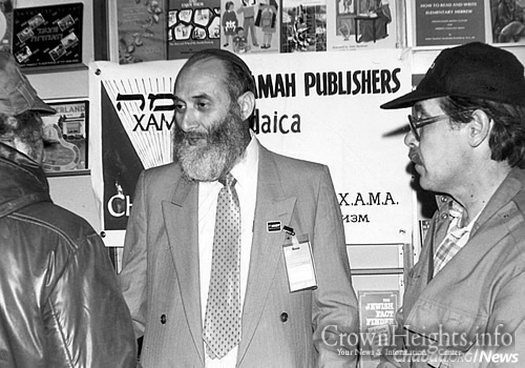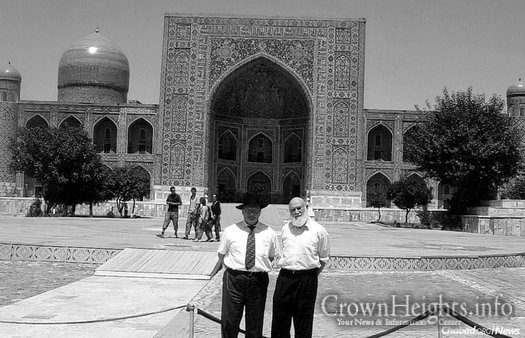
Hero of USSR Underground to Be Honored By U.S. Senate
by Dovid Margolin – Chabad.org
Growing up and coming of age in the Soviet Union, it’s unlikely that Rabbi Hillel Zaltzman could have ever imagined being honored in Washington, D.C., as part of Jewish American Heritage Month.
But that’s exactly what Zaltzman, president of Chamah International, will experience when he is honored on Wednesday, May 25, for his humanitarian and Jewish outreach work at a luncheon on Capitol Hill.
“We never dreamed we’d ever even be allowed to leave,” says Zaltzman. “Never mind be honored in the United States Senate!”
His is a story that has captivated thousands since he published his memoir, Samarkand, last year in Hebrew, English and Russian. Much of the early part reads similarly to other World War II-era recollections—born in Kharkov, Ukraine, in 1939, his family fled the Nazi invasion when he was just a toddler, heading east to Samarkand, Soviet Asia. Relatives who stayed behind ultimately perished.
But it was there, in Uzbeki Samarkand, that a Chabad-Lubavitch Chassidic community established itself. And it’s on this little known but important chapter of Soviet Jewish history that Zaltzman’s widely acclaimed book sheds much light, revealing a world within a world.
In Samarkand, the Chassidic Jews established synagogues and a yeshivah; held brit milahs, bar mitzvahs and weddings; and mourned the loss of loved ones at the front and at home. In 1946, a majority of this underground community escaped to the West by procuring false Polish papers and crossing the border out of the Soviet Union at Lvov (today, Lviv)—but some remained behind, including Zaltzman and his family. They remained in Samarkand for nearly another three decades, given permission to finally leave in 1971.
‘The Hardest of Conditions’
Many Soviet Jews who experienced the horrific years under Stalin—and then the state-sponsored anti-Semitism that followed during Nikita Khrushchev’s premiership, and everything in between—are surprised when they read Zaltzman’s memoirs, which recount an underground religious Jewish community that continued to exist through the 1950s, ’60s and ’70s, complete with a cheder, mikvah andmatzah bakery. That an active, secret Jewish community fueled by young people existed during those dark years came as news to them.
It was in the Soviet Union that Zaltzman and a small group of friends started Chamah, which they used to help their fellow Jews spiritually and materially—for example by procuring extra coal to heat their homes during the winter. Later, they began traveling throughout Uzbeki villages and reaching out to local Bukharian Jews, convincing them to send their children to Jewish schools and classes they were establishing in the area.
After his arrival in the United States, Zaltzman and his partners continued their work on behalf of Soviet Jewry, expanding Chamah’s operations to include medical aid, furthering Jewish education among Russian Jews in America and abroad, and establishing a publishing house.
“The honor does not only go to me, but to my parents, teachers and mentors, who raised us as religious Jews even in the hardest of conditions,” says Zaltzman. “This is an opportunity to say thank you to Jews and non-Jews alike who stood up for us in Russia. The Lubavitcher Rebbe [RabbiMenachem M. Schneerson, of righteous memory] often spoke about the founders of this country, who worked to establish refuge from religious persecution here. Since then, millions more found refuge here, as did I. This is a very great honor for me.”

















Anonymous
Wow!
Such Mesiras Nefesh…
anony
What about his colleagues who worked tirelessly alongside him all these years, don’t they deserve at least an honorable mention in this article?
Anonymous
Attn. Anony. You have a point.. however, it does mention Rabbi zaltzman and his friends.. u mention one.. you have to mention all.. and that is beyond the scope of this article…
However in the book Samarkand.. one of the great things about the book, is that it is not about Rabbi zaltzman only…. it’s about many heroic chasidim of those times!!!
previous employee
Yea Rabbi Zaltsman!!! worked for them 35 years ago on Kingston Ave. Dedicated non-stop sincere Rabbi’s
Moshe Eliyahu
Is Chamah officially under Merkos L’inyonei Chinuch ? If yes plz share if u know, & since when, Merkos has a lot of sub organizations, some are official, some are not.